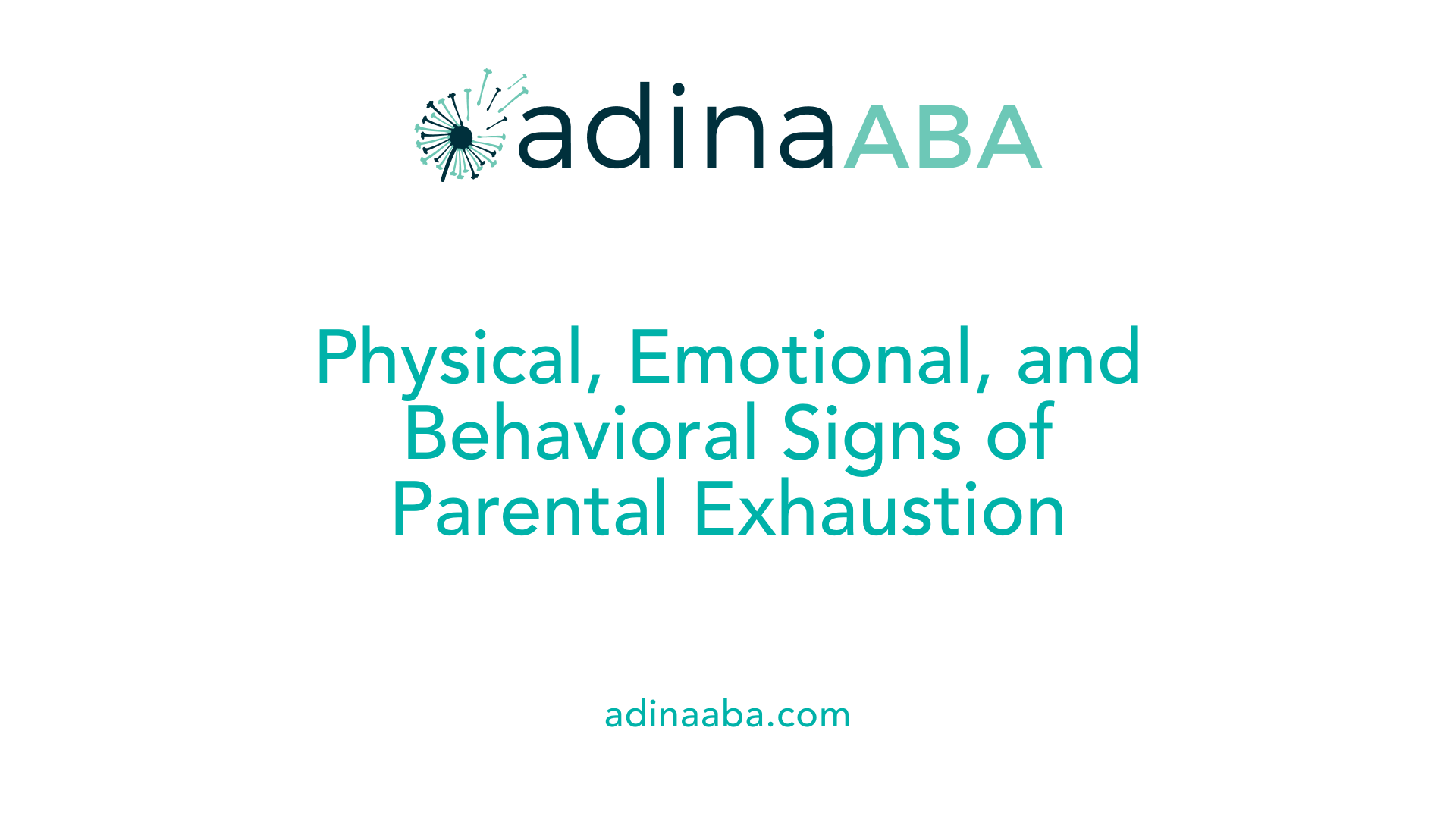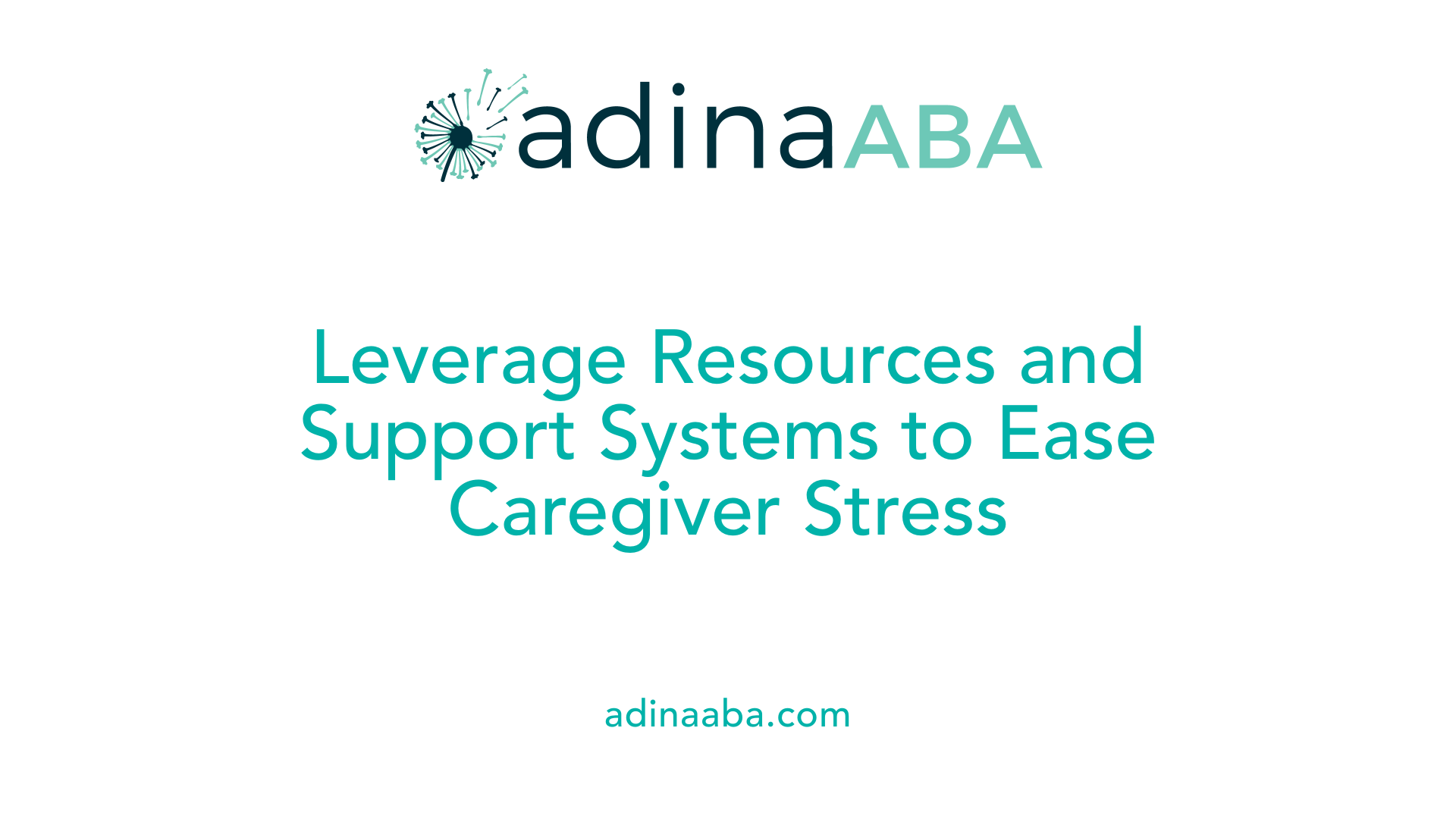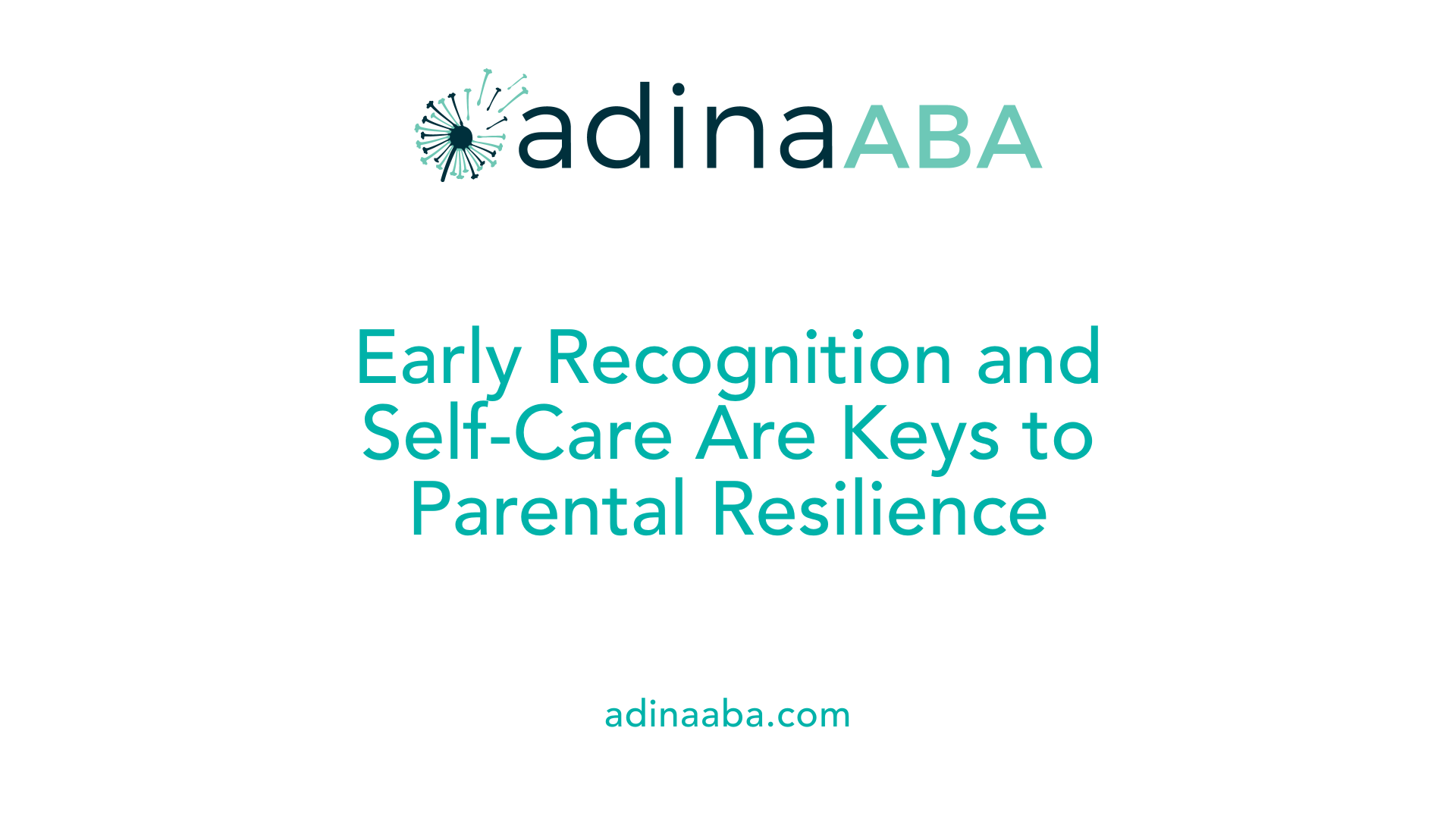Parental burnout and how to cope during autism therapy

Navigating the Landscape of Autism Parenting: Recognizing Burnout and Building Resilience
Caring for a child with autism presents unique challenges that can lead to parental burnout—a state of emotional, physical, and mental exhaustion. This comprehensive overview aims to equip parents and caregivers with knowledge about the signs, causes, and research-backed strategies for managing burnout effectively. Recognizing the importance of self-care, community support, and systemic resources, caregivers can foster their well-being while providing the best possible care for their children.
Signs and Symptoms of Parental Burnout in Autism Caregiving

What are the signs and symptoms of parental burnout in the context of caring for an autistic child?
Parents caring for children with autism often face intense demands that can lead to burnout, a state of deep physical, emotional, and mental exhaustion. Recognizing the early signs is essential for seeking support and implementing strategies to manage stress.
Physically, burnout presents through persistent fatigue that doesn't improve with rest. Parents may experience frequent headaches, sleep disturbances, gastrointestinal issues, and a general sense of physical exhaustion. These symptoms reflect the body’s response to prolonged stress and overwork.
Emotionally, burnout manifests as irritability, emotional numbness, and feelings of helplessness or hopelessness. Parents may feel overwhelmed by ongoing responsibilities and may lose interest or joy in activities they once enjoyed. Anxiety levels can rise, along with depressive symptoms, which further drain emotional resilience.
Behaviorally, parents might withdraw from social interactions and neglect responsibilities such as household chores or self-care routines. Changes in eating habits—either overeating or loss of appetite—are common, and some may turn to increased alcohol or substance use as coping mechanisms.
Early recognition of these signs allows parents to seek help proactively. Support options include respite care to provide breaks, connecting with peer support groups, and consulting mental health professionals for counseling. These interventions can prevent the escalation of burnout and promote better well-being for both parents and children.
Causes and Risk Factors of Parental Burnout in Autism Care

What are the causes and risk factors contributing to burnout among parents of autistic children?
Parental burnout in the context of autism care is driven by a combination of objective and subjective stressors. One of the primary factors is the high caregiving demand, especially for children with severe autism who exhibit challenging behaviors such as irritability, hyperactivity, and oppositional conduct. These behaviors require constant management, often involving routines like medication administration, therapeutic exercises, and vigilant supervision. Such intense responsibilities can interfere with parents' work life, social activities, and financial stability.
Alongside these tangible pressures, internal emotional aspects play a crucial role. Chronic worry about the child's future, feelings of guilt about unmet parenting expectations, sadness from ongoing struggles, and internalized stigma can heighten internal stress. These emotional burdens often lead to feelings of exhaustion, depression, and anxiety.
The absence of a reliable social support network further compounds the problem. Social isolation, misunderstandings within the community about autism, and systemic inadequacies within healthcare and educational systems create additional barriers. Families may struggle to access respite care or support services, intensifying feelings of being overwhelmed.
Background variables also influence burnout risk. Ethnic, racial, and language differences can present systemic challenges and misconceptions, making it harder for some parents to receive appropriate support. Family structure, such as having multiple children or single-parent households, adds layers of responsibility and stress.
In summary, the causes of burnout are multifaceted, involving behavioral, emotional, systemic, and social factors. Recognizing these risks enables targeted interventions to support parents in managing their well-being and sustaining their caregiving roles effectively.
Effective Strategies for Preventing Parental Burnout

What strategies can help prevent parental burnout during autism care?
Caregivers of children with autism are often faced with relentless demands, making self-care essential to prevent burnout. Prioritizing basic activities such as getting enough sleep, staying hydrated, and engaging in physical exercise can significantly boost physical and emotional resilience. Taking regular breaks, even if brief, is another critical strategy allowing parents to recharge.
Building a supportive network tailored to individual needs provides a crucial emotional safety net. This can include joining local community groups, accessing respite care, or connecting with other parents through online forums. These relationships not only offer practical help but also foster a sense of belonging, reducing feelings of isolation.
Adjusting and reframing expectations play a vital role. Accepting the child's unique needs and embracing a flexible mindset can diminish frustration. Educating oneself about autism helps parents understand behaviors, reducing feelings of helplessness and creating more patience and empathy.
While informal support from friends and family is beneficial, leveraging formal services like professional therapy, counseling, or support programs provides structured assistance. This can help parents develop coping strategies and emotional resilience.
Maintaining healthy relationships, especially with a partner or co-parent, is vital. Open communication and shared responsibilities lighten the caregiving load. When needed, seeking mental health support from professionals ensures parents have the tools necessary to manage stress effectively.
Overall, combining these strategies—care for oneself, building support, managing expectations, utilizing professional help, and nurturing relationships—creates a sustainable approach to parenting children with autism, reducing the risk of burnout and promoting family well-being.
Practical Coping Mechanisms and Self-Care Tips

What practical coping mechanisms and self-care tips can support parents experiencing burnout?
Parents facing burnout often find relief through a variety of practical strategies that focus on safeguarding their well-being. One of the most essential steps is prioritizing rest by ensuring adequate sleep each night. Good sleep hygiene helps improve mood, energy, and overall health.
Engaging in regular physical activity, even short walks or gentle exercises, can boost mood and reduce stress. Complementing this with nutritious meals provides the energy needed to manage daily demands.
Seeking social support is vital. Joining peer groups, either locally or online, allows parents to share experiences, gain advice, and feel less isolated. Building a support network also includes reaching out to family and friends for emotional and practical assistance.
Practicing mindfulness activities, such as meditation or deep breathing exercises, helps parents maintain emotional balance. Keeping a gratitude journal, where they note positive aspects of each day, can reframe their perspective and foster resilience.
Setting clear boundaries around their time and responsibilities is crucial. By asking for help and advocating for respite care, parents can secure necessary breaks to rest and recharge.
Incorporating spiritual or faith-based activities offers comfort and hope, providing additional strength during difficult periods.
Implementing these small, consistent self-care practices can significantly ease feelings of exhaustion and help sustain parents’ mental and physical health, ultimately benefiting both their own well-being and their child’s developmental journey.
Resources and Support Systems for Autism Caregivers

What resources and support systems are available to help manage caregiver stress for parents of children with autism?
Parents caring for children with autism can access a wide range of support options designed to ease their stress and improve their caregiving experience.
Reputable organizations such as Autism Speaks, the Autism Society of America, and Lighthouse Autism Center provide support groups, educational materials, and specialized training programs. These services help parents learn effective strategies, connect with others facing similar challenges, and gain emotional support.
Online communities like My Autism Team offer platforms where parents can share experiences, ask questions, and receive advice at their own pace. Digital resources, including the WHO’s eCST (e-learning Caregiver Skills Training), allow caregivers to acquire new skills through flexible, self-guided modules, empowering them to handle daily challenges more confidently.
Professional interventions also play a vital role. Telehealth services provide accessible therapy and parent training without the need to travel. Evidence-based approaches such as naturalistic developmental behavioral strategies can be implemented at home with proper guidance, fostering positive developmental outcomes for children while supporting caregiver mental health.
In addition to these resources, prioritizing self-care is essential. This includes seeking emotional support from family, friends, and mental health professionals, and engaging in activities that promote relaxation and well-being. Combining these support systems and strategies can significantly reduce caregiver stress, helping parents sustain their vital role while maintaining their health.
The Impact of Autism Care on Parental Mental Health
How does caring for an autistic or neurodivergent child affect a parent's mental health, and how can they seek support?
Caring for a child with autism or other neurodivergent conditions often takes a significant toll on a parent’s mental health. Many parents report increased levels of stress, anxiety, and depression, which can also lead to feelings of social isolation. These emotional struggles are amplified during particularly challenging periods, such as health crises or pandemic times like COVID-19, where support networks may be less accessible.
The severity of the child's symptoms influences caregiver wellbeing. Parents of children with more intense or complex symptoms—such as severe communication difficulties or behavioral challenges—typically face higher stress levels. societal stigma and misconceptions about autism further contribute to emotional exhaustion, making parents feel misunderstood or judged, which worsens feelings of isolation.
Support networks are vital in alleviating these mental health stresses. Informal support from friends, family, and community groups provides emotional comfort and practical help, reducing feelings of burden. Meanwhile, formal support from mental health professionals offers strategies for managing symptoms of anxiety, depression, or burnout that may arise.
Parents are encouraged to seek diverse sources of support. Connecting with peer groups, either locally or through online communities, allows shared experiences and advice. Accessing professional mental health services such as counseling or therapy can guide coping mechanisms and emotional processing.
Furthermore, advocacy and education around autism can help combat societal misunderstandings. Increasing public awareness fosters a more supportive environment, reducing stigma and helping parents feel validated and understood.
In summary, while caring for an autistic or neurodivergent child places emotional strain on parents, seeking support through mental health services, community involvement, and societal education can significantly improve their mental wellbeing and resilience.
Research-Based Insights on Managing Stress and Emotional Well-being
What are research-based insights into managing stress and emotional well-being for autism parent caregivers?
Research indicates that resilience plays a vital role in helping parents of children with autism manage stress. Higher resilience correlates with lower feelings of perceived burden and emotional exhaustion. Building resilience can involve developing adaptive coping strategies, maintaining a positive outlook, and seeking social support.
In addition to resilience, emotional regulation techniques, such as mindfulness meditation, deep breathing exercises, and cognitive reframing, are proven effective in reducing stress levels. These methods help parents stay grounded amid daily challenges and prevent emotional overwhelm.
The importance of social support cannot be overstated. Connecting with family, friends, support groups, or online communities provides emotional reassurance and practical assistance. However, support networks may sometimes inadvertently increase feelings of guilt or emotional burden, especially if parents frequently compare themselves to others or feel they are not receiving enough help. Tailored interventions that address these emotional responses are essential.
Physical symptoms like fatigue, fatigue-related insomnia, and physical health problems are intertwined with emotional stress. Prioritizing self-care—such as ensuring adequate sleep, balanced nutrition, and regular physical activity—can mitigate these effects and improve overall mental health.
Lastly, addressing autism-specific challenges through targeted interventions can significantly lower parental stress. Programs that improve communication and manage behavioral issues in children reduce caregiver anxiety and foster more positive family interactions.
In summary, an integrated approach combining resilience building, emotional regulation, tailored social support, physical self-care, and effective child-focused interventions is recommended for maintaining caregivers’ emotional well-being and reducing burnout.
Supporting Parental Mental Health During Autism Therapy
How can parents support their mental health while navigating autism therapy and caregiving?
Parents caring for children with autism often face intense emotional and physical demands, which can lead to burnout if not managed carefully. To support their mental well-being, parents are encouraged to connect with support networks such as parent groups, community organizations, and peer communities. These groups provide emotional support, practical advice, and a sense of belonging, helping reduce feelings of isolation and stress.
Implementing caregiver-mediated interventions like Project ImPACT and JASPER has dual benefits. Not only do these programs promote better social and communication skills in children, but they also empower parents, giving them a sense of efficacy and involvement in their child's progress. Such active participation can boost parental confidence and decrease feelings of helplessness.
Prioritizing self-care strategies is essential. Parents should regularly schedule time for rest, leisure, and relaxation. Techniques such as mindfulness meditation, acceptance and commitment therapy (ACT), or mindfulness-based stress reduction (MBSR) can help manage anxiety, improve emotional resilience, and prevent burnout.
Seeking professional mental health support is another vital step. Counseling, therapy, or support from mental health professionals specialized in caregiver stress can help parents process complex emotions, develop coping skills, and maintain mental health.
Lastly, staying informed through accurate resources about autism and collaborating closely with healthcare and educational professionals can reduce uncertainty and foster a proactive, positive caregiving environment. This approach enables parents to feel more in control and better equipped to navigate ongoing therapy and daily challenges.
Conclusion: Nurturing Resilience and Well-being in Autism Parenting

Summarizing key points about burnout signs, causes, prevention, and support
Parent burnout, especially among parents of children with autism, manifests through physical exhaustion, emotional detachment, and decreased overall functioning. Symptoms include fatigue, irritability, social withdrawal, and increased anxiety or depression. The demanding nature of caregiving—such as managing behavioral challenges, sensory issues, and advocating for proper services—often leads to this exhaustion.
Burnout is driven by factors like chronic stress, societal pressures, lack of support, and the complex needs of autistic children. Recognizing early signs—such as persistent fatigue, mood changes, and withdrawal—is essential for taking effective action. Practical prevention strategies encompass self-care activities like establishing routines, seeking respite, setting boundaries, and using community support.
Emphasizing the importance of early recognition and proactive measures
Early detection of burnout allows parents to implement strategies that mitigate its impact. Taking small steps such as reaching out for help, planning regular breaks, and practicing mindfulness can significantly improve mental health.
Engaging in positive self-talk, lowering unrealistic standards, and fostering honest communication with children are vital. Parenting support groups, professional therapy, and community resources offer additional avenues to restore well-being.
Highlighting the role of community, systemic support, and self-care in sustaining families
A strong community network plays a crucial role in buffering against burnout. Support from family, friends, and professional services provides emotional relief and practical assistance. Systemic support, including improved healthcare, education services, and social policies, is vital for reducing systemic barriers faced by families.
Self-care is not a luxury but a necessity. It involves prioritizing sleep, nutrition, physical activity, and mental health practices like mindfulness and therapy. Collectively, these approaches foster resilience, help parents sustain their caregiving roles, and create healthier family dynamics, ensuring that both parents and children thrive.
Fostering Resilience and Support for Autism Caregivers
Addressing parental burnout in autism caregiving is essential for both the well-being of parents and the developmental progress of children. Recognizing early signs, understanding the complex causes, and actively applying practical strategies are vital steps toward sustaining families through these challenges. Building strong support networks, utilizing available resources, and prioritizing self-care help mitigate burnout and foster resilience. Society and healthcare systems must also continue to improve accessibility and understanding, creating an environment where caregivers are empowered, supported, and able to thrive alongside their children.
References
- Parent Burnout is Real... 5 Tips That Help
- Parenting in Autistic Burnout - Dr Alice Nicholls
- Coping with Burnout as a Parent of a Special Needs Child - Talkspace
- Navigating Autistic Burnout as an Autistic Parent
- Effective Strategies For Managing Autism Parent Burnout
- How Parents and Caregivers of Kids with Autism Cope with Stress
- Parental mental health and wellbeing - Autism Awareness Australia
- Neurodivergent, ADHD, and Autistic Parent Burnout: How to Know if ...
- How To Prevent Burnout as a Parent or Caregiver of a Child on the ...
- CAMHS: Coping with parent carer burnout David Gray-Hammond
More Resources
Expert Clinicians
Get started today ->


.jpg)
.jpg)

.jpg)
